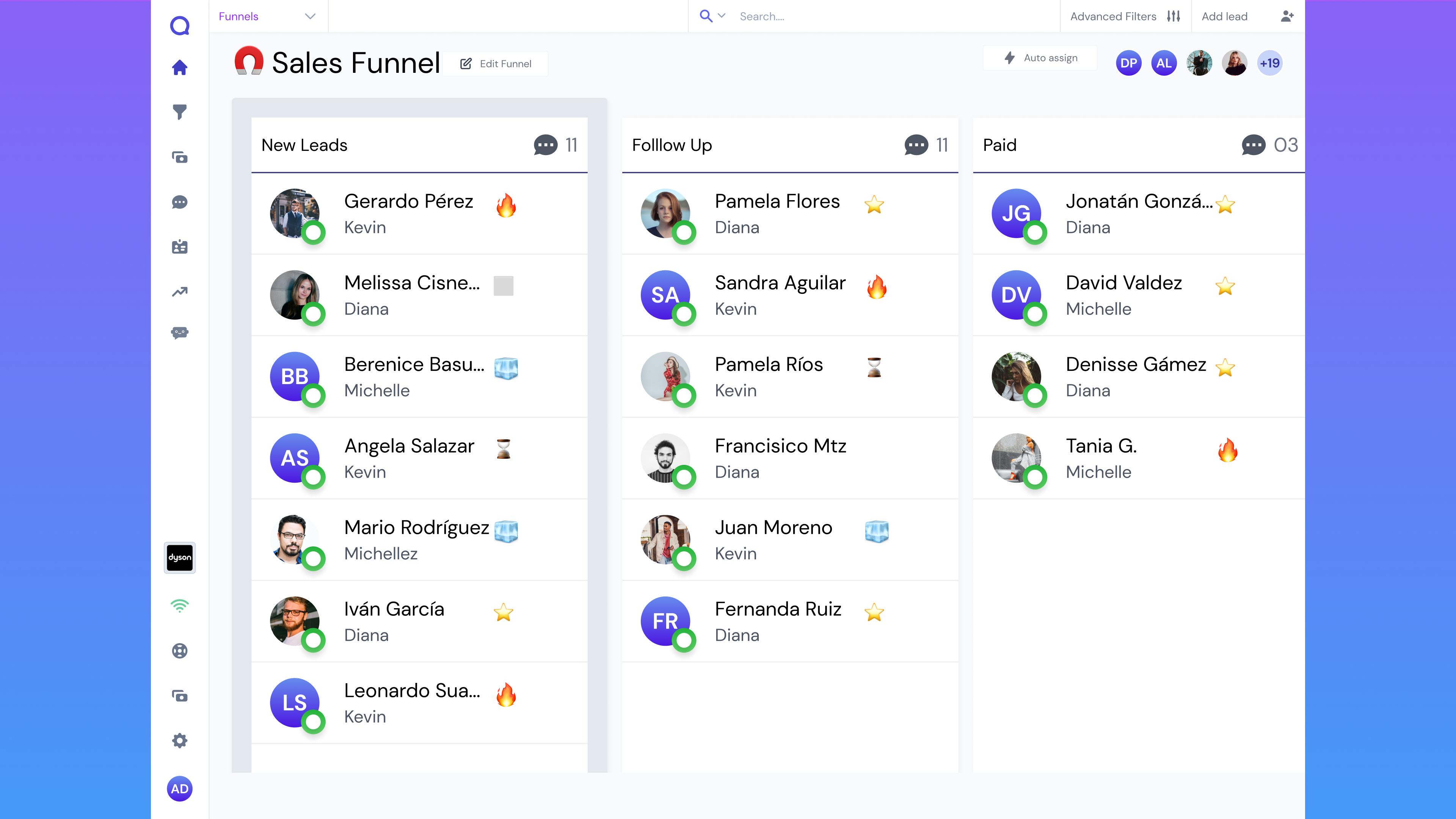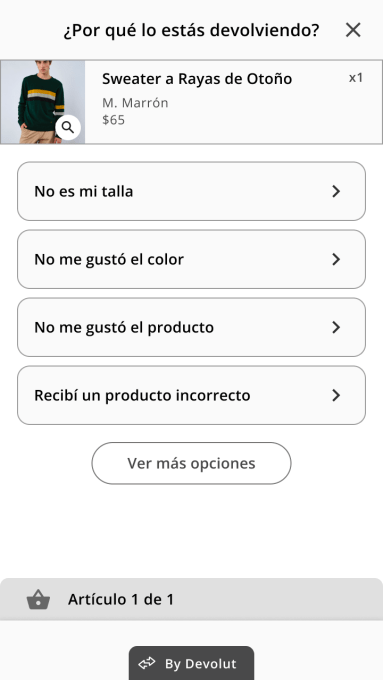Brazilian startup Salvy, a mobile carrier for businesses, was the only company based in Latin America in Y Combinator's latest batch, the accelerator confirmed to TechCrunch.
© 2024 TechCrunch. All rights reserved. For personal use only.

Product Management Confabulation
What Product Managers are talking about.
Brazilian startup Salvy, a mobile carrier for businesses, was the only company based in Latin America in Y Combinator's latest batch, the accelerator confirmed to TechCrunch.
© 2024 TechCrunch. All rights reserved. For personal use only.
Brazilian startup Salvy, a mobile carrier for businesses, was the only company based in Latin America in Y Combinator's latest batch, the accelerator confirmed to TechCrunch.
© 2024 TechCrunch. All rights reserved. For personal use only.
Simetrik created the Simetrik Building Blocks, scalable and adaptable concepts based on no-code development and generative AI technologies.
© 2024 TechCrunch. All rights reserved. For personal use only.
Mobile commerce in Latin America is expected to continue a healthy growth streak over the next few years, and Leadsales, a Mexican startup, wants to help small and medium businesses in Latin America manage all of those potential sales via WhatsApp and social media channels.
The conversational commerce company already has Meta as a business partner and has developed a customer relationship management tool that provides customizable columns and sales funnel automation.
Here’s how it works: Companies can store customer information and then centralize into columns chats that come in, for example, billing, product inquiries or random questions. Those chats can be assigned to the best sales leads and configured to provide recommendations and instant messages.
Roberto Peñacastro, Leadsales’ founder and CEO, started the company in 2020 after working with co-founder David Villa Cañez at Villa Cañez’s previous startup mienvio, providing logistics SaaS for LatAm e-commerce businesses. Prior to that, Peñacastro worked for Google to help small businesses scale their sales via ads.
“We quickly noticed a trend that small businesses were transitioning to selling via WhatsApp without the right tool to scale their business,” Peñacastro said via email. “Our native chat integration on our pipeline view is truly unique as no other CRM does this integration for chats, and on top of this, we’ve built a platform that is built for non-tech savvy users that takes less than five minutes to ‘plug & play.’”

Leadsales’ CRM sales funnel. Image Credits: Leadsales
Peñacastro and Villa Cañez bootstrapped the company to more than 1,400 customers, a presence in Mexico, Colombia and Perú, and $1.6 million in annual recurring revenue, before deciding to go after venture capital.
Leadsales recently closed on $3.7 million of seed funding, led by Ulu Ventures and Blue Pointe Ventures, to make more hires and expand into Brazil. The country is a big user of WhatsApp and is where Meta is piloting native payments integration via WhatsApp, Peñacastro said.
Leadsales joins a growing group of conversational commerce startups raising capital in the past few years; for example Yalo, Whym, Charles and Wizard. Even Walmart is doing it. However, Peñacastro said Leadsales’ closest competitors are the more traditional customer relationship management companies like HubSpot, Salesforce and Pipedrive.
“Our moat is that current CRMs are becoming old for the new trends of conversational commerce through instant chat,” he said. “The way we are different is on our native integration with chat for small businesses that rely on WhatsApp communications to get the sales closed.”
In addition to Brazil, the company has plans to expand into India, Africa and Southeast Asia with a Series A in the near future.
Peñacastro expects to double Leadsales’ customers by the end of 2023 following the launch in Brazil next month and then 10x the company’s annual recurring revenue in 2024.
With the explosion of e-commerce during the global pandemic, companies not only had to adopt Amazon-like shipping skills, but also how to coordinate and manage returns.
In Latin America, the reverse logistics process “is a mess,” according to Agustin Shutte, founder and CEO of Devolut, which provides an end-to-end returns solution for e-commerce sellers.
“It’s dominated by traditional carriers who are not reliable, are super expensive and take forever to take the product back to the merchant,” Shutte told TechCrunch. “This leads to refunds taking 40 to 50 days. Developing a network of return points, like Happy Returns did in the U.S., is something completely unique that no one is doing.”
He started the Mexico-based company earlier this year with Emiliano Monge. This is their second startup together, having previously founded another logistics startup where they saw firsthand how inefficient the return process was.
Devolut is still very much in its early stages, having launched just three months ago. However, the company is already working with 20 B2B clients across three countries.
Taking a nod from Happy Returns, Devolut enables sellers a returns option that doesn’t require boxes or labels through a network of what will be “city points,” where those who want to return merchandise can go, for example, a pharmacy or convenience store.
Along with that is software that fully automates the process and technology that assesses item conditions upon receipt. Buyers get a QR code that will be scanned by the clerk at the city point who then puts the item in a plastic bag, scans a preprinted return label and puts the item inside reusable bins, Shutte explained. In most cases, Devolut will be able to provide instant refunds and save merchants up to 50% in returns management costs.

Devolut’s returns dashboard. Image Credits: Devolut
While it is focused on returns, the company is also using AI to promote exchanges instead of refunds so that merchants can retain more revenue, Shutte said. Devolut plans to make money from a monthly software charge for the merchant, a per return charge for managing the process and charging a percentage for any upsells or cross selling.
One of the unique things is that Devolut essentially has government backing for its developing a returns ecosystem. Shutte said some countries, including Mexico, Brazil, Argentina and Colombia, have recently passed laws forcing merchants to take returns from online purchases.
“More importantly than that, is that Amazon and MercadoLibre are setting a new bar in terms of post-purchase experience,” he added. “Just like same- or next-day delivery changed the game in LatAm, now they expect the same experience from every direct-to-consumer brand. Whether the merchants like it or not, returns in LatAm are increasing, and clients are demanding a much better experience. Maybe even more relevant is the fact that it’s been widely proven that a good return experience generates up to 30% in revenues, so the ROI on a solution like ours is 50x to 60x.”
There are some other startups working on this reverse logistics problem, for example, Rever, Loop Returns, ReturnLogic, Seel and Sendcloud. However, Shutte said Devolut’s closest competitor is Reversso, a Chilean company providing each customer a custom portal to manage returns. The main differentiator, according to Shutte, being that Reversso is focused on software rather than an end-to-end solution, while Devolut will have that network of return points.
Today, the company announced that it raised $600,000 in pre-seed funding. Investors in the round include Seedstars International Ventures, FJ Labs, Far Out Ventures, Pareto 20 and Forum Ventures.
Devolut intends to further develop its AI-powered returns and exchange algorithms that generate product recommendations and instant returns, eventually for refunds via its own digital wallet. It is also testing its tool with Sally Beauty’s 240 stores in Mexico.
“Latin America is a region where commerce is growing the most, so we see our solution coming as the next wave: first it was digital payments, second, same-day delivery and now the third wave is post-purchase,” Shutte said. “We see how big the market could become. In the U.S., people buy around 50 to 60 purchases per year, however, in LatAm it is two per year. That could grow 7x compared to today, so that is an enabler to grow.”
Listen here or wherever you get your podcasts.
Hello, and welcome back to Equity, the podcast about the business of startups, where we unpack the numbers and nuance behind the headlines.
This is our Wednesday show, in which we sit down with a guest, talk about their work and unpack the rest. This week, Mary Ann spoke with Mercedes Bent, partner on the early stage team at Lightspeed Ventures and co-lead of Lightspeed’s LatAm region and angel fund. The pair chewed through a number of topics, including:
Equity is back on Friday with our weekly news roundup! Talk to you then!
For episode transcripts and more, head to Equity’s Simplecast website.
Equity drops at 7 a.m. PT every Monday, Wednesday and Friday, so subscribe to us on Apple Podcasts, Overcast, Spotify and all the casts. TechCrunch also has a great show on crypto, a show that interviews founders and more!